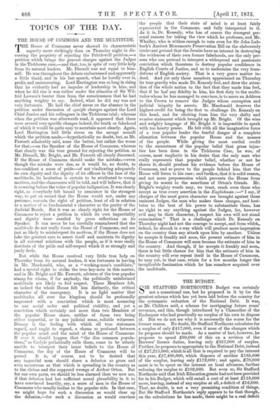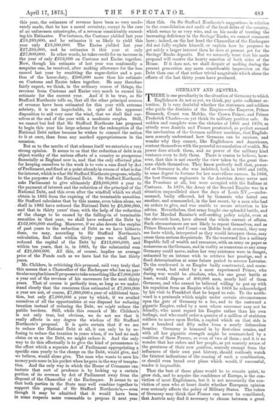THE BUDGET.
SIR STAFFORD NORTHCOTE'S Budget was certainly not a sensational one, but he proposed in it by far the greatest scheme which has yet been laid before the country for the systematic reduction of the National Debt. It was, as Mr. Childers said, a scheme for mortgaging future years' revenues, and this, though introduced by a Chancellor of the Exchequer who had practically no surplus of his own to dispose of. But we do not see why it is necessarily the worse for the former reason. No doubt, Sir Stafford Northcote calculates for a surplus of only £417,000, even if none of the changes which he proposes should be made. As a matter of fact, however, he proposes to spend £60,000 of this on a revision of the Brewers' licence duties, leaving only £357,000 of surplus. Further, he proposes to appropriate to the National Debt, instead of £27,215,000, which is all that is required to pay the interest this year, £27,400,000, which disposes of another £185,000 of the surplus, leaving only £172,000; and again, £70,000 more is to be spent on the interest on local advances, further reducing the surplus to £102,000. But even so, Sir Stafford Northcote said that Irish Education grants had not been provided for in his Budget, which will entail a cost of at least £118,000 more, leaving, instead of any surplus at all, a deficit of £16,000. That, no doubt, is not a very promising condition of things. But Sir Stafford Northcote's reply appears to be that though, on the calculations he has made, there might be a real deficit
this year, the estimates of revenue have been so very mode- rately made, that he has a moral certainty, except in the case of an unforeseen catastrophe, of a revenue considerably exceed- ing his Estimates. For instance, the Customs yielded last year £19,289,000, and he estimates it as likely to yield this year only £19,500,000. The Excise yielded last year £27,395,000, and he estimates it this year at only £27,800,000. In other words, he takes credit for an increase in the year of only £616,000 on Customs and Excise together. Now, though his estimate of last year was confessedly a sanguine one, he received, after making allowance for the loss caused last year by remitting the sugar-duties and a por- tion of the horse-duty, £300,000 more than his estimate on Customs and Excise taken together. He may therefore fairly expect, we think, in the ordinary course of things, the revenue from Customs and Excise very much to exceed his estimate for the current year. And if it be true, as Sir Stafford Northcote tells us, that all the other principal sources of revenue have been estimated for this year with extreme sobriety, it is not improbable, in spite of his apparent disposition to sail very near the wind, that we shall find our- selves at the end of the year with a moderate surplus. Still, we cannot but feel that Sir Stafford Northcote has proposed to begin this year his large scheme for the redemption of the National Debt rather because he wishes to commit the nation to it at once, than from any marked appropriateness in the occasion.
But as to the merits of that scheme itself we entertain a very strong opinion. It seems to us that the reduction of debt is an object worthy of the serious efforts of a country so prosperous financially as England now is, and that the only effectual plan for keeping ourselves to the work is to vote a sum fixed by Act of Parliament, and fixed at a point already in excess of what is due for interest, which is what Sir Stafford Northcote proposes, wholly to the purposes of the National Debt. Sir Stafford Northcote asks Parliament to give ultimately £28,000,000 a year to the payment of interest and the reduction of the principal of the National Debt, and this even after the windfall which we shall obtain in 1885 from the expiring of the terminable annuities. Sir Stafford calculates that by this means, even taken alone, we . shall in 1885 have reduced the National Debt by £6,800,000, and that in thirty years' time, with the help of the reduction of the charge to be caused by the falling-in of terminable annuities in that year, we shall have reduced the Debt by £162,000,000 sterling. Moreover, if we also devote the surplus of past years to the reduction of Debt as we have hitherto done, we may, according to Sir Stafford Northcote's calculation, find that within thirty years we shall have reduced the capital of the Debt by £213,000,000, and within ten years, that is, in 1885, by the substantial sum of £21,000,000. All this, of course, implies an average price of the Funds such as we have had for the last thirty years.
Mr. Childers, in criticising this proposal, said very truly that this means that a Chancellor of the Exchequer who has no par- ticular surplus himself proposes to take something like £7,000,000 a year out of the revenue of his successors for the next thirty years. That of course is perfectly true, so long as we under- stand clearly that the resources thus estimated at £7,000,000 a year are not, of course, £7,000,000 a year of additional taxa- tion, but only £7,000,000 a year by which, if we availed ourselves of all the opportunities at our disposal for reducing taxation instead of reducing the Debt, we might reduce the public burdens. Still, while this remark of Mr. Childers's is not only true, but obvious, we do not see that it really affects in any degree the wisdom of Sir Stafford Northcote's proposal. It is quite certain that if we are to reduce the National Debt at all, it can only be by re- fusing to reduce the taxation in years when, if we had no such claim on us as the Debt, we might reduce it. And the only way to do this effectually is to give the kind of permanence to the effort which a separate Act of Parliament appropriating a specific sum yearly to the charge on the Debt, would give, and we believe, would alone give. The man who wants to save his money puts none in his pocket when he goes in the way of tempta- tion. And the only way in which the House of Commons can imitate that sort of prudence is by locking up a certain portion of its revenue by Act of Parliament away from the disposal of the Chancellor of the Exchequer. It seems to us that both parties in the State may well combine together to support this proposal of Sir Stafford Northcote's,— even though it may be admitted that it would have been in some respects more reasonable to propose it next year than this. On Sir Stafford Northcote's suggestions in relation to the consolidation and audit of the local debts of the country, which seems to us very wise, and on his mode of treating the increasing deficiency in the Savings' Banks, we cannot comment here ; indeed, on the last head the Chancellor of the Exchequer did not fully explain himself, or explain how he proposes to get safely a larger interest than he does at present get for the Savings' Banks deposits. But we earnestly trust that his main proposal will receive the hearty sanction of both sides of the House. If it does not, we shall despair of making during the present generation any more considerable impression on the Debt than one of that rather trivial magnitude which alone the efforts of the last thirty years have produced.



































 Previous page
Previous page